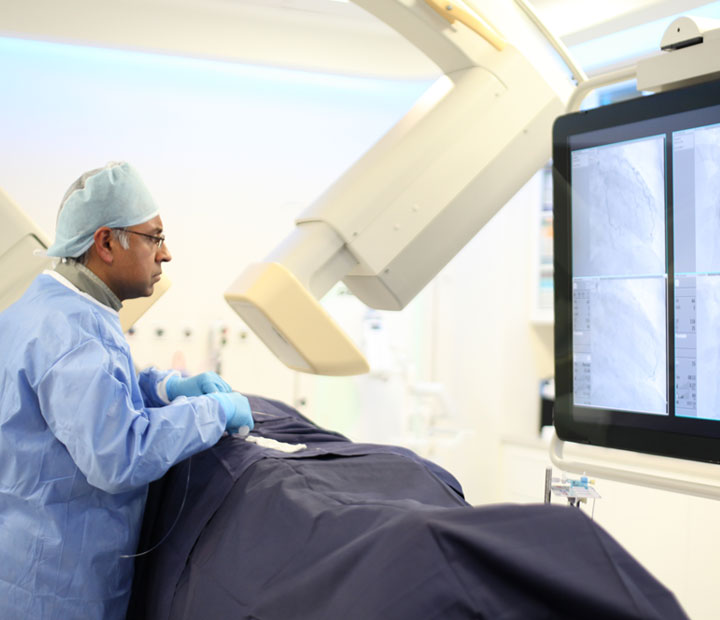CORONARY ARTERY BYPASS GRAFT (CABG) SURGERY
Patients with a narrowing or blockage in the coronary arteries diagnosed by a coronary angiogram may be considered for coronary artery bypass grafting (CABG). This is usually recommended when the narrowings are too severe, complex or widespread to be treated by medication and / or coronary angioplasty and surgery provides both symptom relief and the best long term outcome. Although routine, this is a major operation and will require at least 1 week’s stay in hospital and 6-8 weeks to fully recover.
What happens during coronary bypass surgery?
Patients receive a general anaesthetic and are completely asleep. The breast bone is separated, which allows visible and physical access to the heart. In most cases, blood circulation and breathing functions will be taken over by a heart-lung machine (cardio-pulmonary bypass) although in some instances CABG can be performed on a beating heart (off-pump technique). The surgeon uses a segment of vein (taken from the leg) or artery (taken from within the chest or arm) to bypass or ‘get around’ the blockage. It is usual to have more than one and usually three or four arteries bypassed, which will improve the blood and oxygen supply to the heart muscle. The operation lasts between 2 and 6 hours. After your operation you will be moved to intensive care for close monitoring until you wake up. Once your condition is stable, you will be moved to the high dependency unit or the cardiac ward.
What are the risks associated with coronary bypass surgery?
Like all types of surgery, CABG carries a risk of complications, some of which are fatal, such as a stroke or heart attack. The risks of serious complications can vary, depending your age, whether you have other serious health conditions, such as kidney or lung disease, whether the surgery is performed as an emergency and the general state of your heart. Several pre-operative tests will allow your cardiologist to determine the overall risk benefit balance of having surgery. The outcome after CABG is dependent upon several factors, including compliance to medication and lifestyle modification, but successful grafts typically last 8-15 years.

Frequently Asked Questions
While information online about Coronary Artery Bypass Graft (CABG) surgery may be useful and informative, it is best to always consult a medical professional for accurate diagnosis and appropriate treatment. Here are some frequently asked questions about CABG surgery:
What is Coronary Artery Bypass Graft (CABG) surgery?
Coronary Artery Bypass Graft (CABG) surgery improves blood flow to the heart by diverting blood around narrowed or blocked coronary arteries. This is achieved by grafting a healthy blood vessel, often from the leg or chest, to bypass the obstructed artery, thereby restoring adequate oxygen supply to the heart muscle.
How long does recovery from CABG surgery typically take?
Recovery from CABG surgery generally involves a hospital stay of about one week, followed by a home recovery period lasting 6 to 12 weeks. Patients may gradually resume normal activities during this time, with full recovery depending on individual health factors and adherence to postoperative care guidelines.
What are the common risks associated with CABG surgery?
CABG surgery carries risks similar to other major surgeries, including infection, bleeding, and reactions to anaesthesia. Specific complications may involve irregular heart rhythms, kidney dysfunction, or memory issues. While serious complications are uncommon, they can include stroke or heart attack, particularly in patients with existing health conditions.
When is CABG surgery recommended over other treatments?
CABG surgery is often recommended for individuals with severe coronary artery disease, especially when multiple arteries are blocked or when blockages are not amenable to less invasive procedures like angioplasty. It is particularly indicated when significant symptoms persist despite medication or when there's a high risk of heart attack.
What does the CABG surgical procedure involve?
During CABG surgery, the patient is placed under general anaesthesia, and the chest is opened to access the heart. A healthy blood vessel from another body part is then grafted to bypass the blocked coronary artery. The procedure typically lasts 3 to 6 hours, depending on the number of arteries bypassed.
What lifestyle changes are recommended after CABG surgery?
Post-CABG surgery, adopting a heart-healthy lifestyle is crucial. This includes a balanced diet low in saturated fats, regular physical activity, smoking cessation, and stress management. These changes help prevent further arterial blockages and promote overall cardiovascular health.



